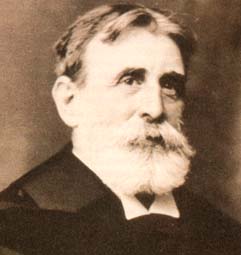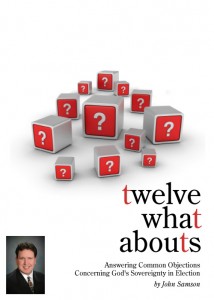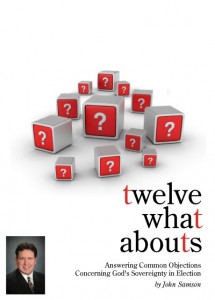Ravi Zacharias in Belgium preaching on the search for meaning in life.
Ravi Zacharias in Leuven from CityLife Leuven on Vimeo.

Ravi Zacharias in Belgium preaching on the search for meaning in life.
Ravi Zacharias in Leuven from CityLife Leuven on Vimeo.
 B. B. Warfield
B. B. Warfield
Benjamin Breckinridge Warfield (November 5, 1851 – February 16, 1921) was professor of theology at Princeton Seminary from 1887 to 1921. Some conservative Presbyterians consider him to be the last of the great Princeton theologians.
Kim Riddlebarger posts an excerpt from his dissertation giving an overview of Warfield’s life. Here are a couple of extracts about his marriage:
Soon after marrying Annie Pearce Kinkead, who was also from noble stock, the newlyweds journeyed to Leipzig…
During their stay in Europe an event occurred that would forever change the Warfield’s lives. While walking together in the Harz mountains, Mr. and Mrs. Warfield were caught in a violent thunderstorm. Annie Warfield suffered a severe trauma to her nervous system from which she never fully recovered. She was so severely traumatized that she would spend the rest of her life as an invalid of sorts, becoming increasingly more incapacitated as the years went by. Her husband was to spend the rest of their lives together giving her “his constant attention and care” until her death in 1915 (Allis, “Personal Impressions of Dr Warfield,” 10). B. B. Warfield could not have foreseen just how constant and difficult a demand this was to become, and how, in the providence of God, this would impact his entire career.
. . . Warfield’s remarkable literary output is, no doubt, in large measure due to the frail condition of his wife and his amazing devotion to her. With the pen he was a formidable foe, but as O. T. Allis recalls, “I used to see them walking together and the gentleness of his manner was striking proof of the loving care with which he surrounded her. They had no children. During the years spent at Princeton, he rarely if ever was absent for any length of time” (Allis, “Personal Impressions of Dr Warfield,” 10). Machen recalled that Mrs. Warfield was a brilliant woman and that Dr. Warfield would read to her several hours each day. Machen dimly recalled seeing Mrs. Warfield in her yard a number of years earlier during his own student days, but notes that she had been long since bed-ridden (Stonehouse, J. Gresham Machen, 220).
According to most accounts, Dr. Warfield almost never ventured away from her side for more than two hours at a time. In fact, he left the confines of Princeton only one time during a ten-year period, and that for a trip designed to alleviate his wife’s suffering which ultimately failed (Bamberg, “Our Image of Warfield Must Go,” 229)…
Though Warfield may have been known to many as a tenacious fighter, the compassion he directed toward his wife, Annie Kinkead Warfield, demonstrates a capacity for tenderness and caring that is in its own right quite remarkable. In the mysterious providence of God, it was the nature of his wife’s illness and his devotion to her, that ironically provided the greatest impetus for his massive literary output. Personally vital and energetic, “he did not allow” his wife’s illness “to hinder him in his work. He was intensely active with voice and pen” (Allis, “Personal Impressions of Dr Warfield,” 11). Thus his creative energies were focused in two directions: his writing and the classroom. As caretaker for an invalid wife, Warfield spent many hours each day in the confines of his study.
 Larry Londy at the Christian Thinker blog has written a short review of my new book. You might find it to be an interesting read. He writes:
Larry Londy at the Christian Thinker blog has written a short review of my new book. You might find it to be an interesting read. He writes:
There is a new book out by a Pastor friend of mine named John Samson called Twelve What Abouts: Answering Common Objections Concerning God’s Sovereignty in Election. Now I don’t review a lot of books here, only the books that I have read and thought others can benefit from. The mature Christian reader who may be a Calvinist or Arminian might be asking themselves, “Why do I need to read another book on this topic when there are many out there that I have already read, and so many that I haven’t”? Likewise there might be others that feel they don’t understand a lot of the deep teachings of the Bible and shy away from what they see as complicated issues. Still others might say that this issue is not important in my walk with God and I will leave topics like this to the Theologians to fight over. Finally, you might just be someone who goes to church on Sunday and takes what is said on issues like these and doesn’t question it, or sadly, maybe you go to church and topics like this are not even brought up. Well if this fits you, or if there are other reason why you think you don’t want to read a book on this topic such as you don’t have time etc. I encourage you to pick this one up and read it.
Let me tell you a little about the book… here.
On January 20, 2012, Saint Andrew’s was the location for “Theology Night with Sinclair Ferguson and R.C. Sproul.” It was a relaxed and informative evening where two notable theologians and pastors answered questions submitted by online viewers and those present in the audience. Topics addressed included the doctrines of grace, when to leave a local church, Tim Tebow, dispensationalism, free will, and the peccability or impeccability of Jesus.
You can watch it here.
 Since the new book was published in an eBook format, many have asked if it would ever be published in a paperback format. I did not know the answer to that question until two days ago, when I was approached by the owner of a large Christian book publishing company who read the book and is very excited to publish it in paperback form. He wishes for it to be a featured resource at the Together for the Gospel Conference in April.
Since the new book was published in an eBook format, many have asked if it would ever be published in a paperback format. I did not know the answer to that question until two days ago, when I was approached by the owner of a large Christian book publishing company who read the book and is very excited to publish it in paperback form. He wishes for it to be a featured resource at the Together for the Gospel Conference in April.
It is now available for pre-order in paperback and will ship out as soon as it is published (an expected date being late February, 2012).
It was very encouraging to then learn that a gentleman named Randy, in hearing this, immediately placed an order for 40 books, as he wants to make them available to the students in his Bible class.
So the book is now available in two formats: in eBook from monergismbooks here and in paperback (pre-order) from Solid Ground Christian Books here.
Just received this encouraging feedback on the book: “Highly recommend. Mr. Samson gets right to the point in a very well organized book. It seemed that every time a question would pop into my head, I would turn the page and the answer to my question was waiting for me. I have recommended it to a number of my Arminian friends, but they are very resistant. I can identify with that because I know from past experience (as a libertarian free-will believer) I was predisposed to reject Calvinism. But what freedom is found when the blinders come off and the truth slaps you in the face, I pray that this book would get into the hands, then the hearts and minds of people everywhere.”
 Forty Days of Mourning: “I cried through putting her ring on, even as I cry in taking mine off.” – R. C. Sproul, Jr
Forty Days of Mourning: “I cried through putting her ring on, even as I cry in taking mine off.” – R. C. Sproul, Jr
“What does it cost to be a Christian? I grant freely that it costs little to be a mere outward Christian. A man has only got to attend a place of worship twice on Sunday, and to be tolerably moral during the week, and he has gone as far as thousands around him ever go in religion. All this is cheap and easy work – it entails no self-denial or self-sacrifice. If this is saving Christianity and will take us to Heaven when we die–we must alter the description of the way of life, and write, “Wide is the gate and broad is the way that leads to Heaven!” But it does cost something to be a real Christian, according to the standard of the Bible. There are enemies to be overcome, battles to be fought, sacrifices to be made, an Egypt to be forsaken, a wilderness to be passed through, a cross to be carried, a race to be run. Conversion is not putting a man in a soft armchair, and taking him pleasantly to Heaven. It is the beginning of a mighty conflict, in which it costs much to win the victory. Hence arises the unspeakable importance of “counting the cost.” True Christianity will cost a man his self-righteousness, his sins, his love of ease, and the favor of the world. A religion which costs nothing –is worth nothing! A cheap, easy Christianity, without a cross, will prove in the end a useless Christianity, without a crown!” – J. C. Ryle
“No man is greater than his prayer life. The pastor who is not praying is playing; the people who are not praying are straying. The pulpit can be a shop window to display one’s talents; the prayer closet allows no showing off.” – Leonard Ravenhill
“I bless the Lord that all our troubles come through Christ’s fingers, and that He casteth sugar among them: and casteth in some ounce weights of heaven and of the spirit of glory in our cup.” – Samuel Rutherford
“So great is the depravity of unregenerate man that, although there is nothing that he needs more than the gospel, there is nothing that he desires less.” – R. B. Kuiper
“If Christ died for many whose salvation He didn’t secure, that doesn’t give me assurance.” – Dr. Sinclair Ferguson
“If He’s not saving you, then He’s not your Savior.” – Dr. Sinclair Ferguson
“To test the genuineness of a diamond, jewelers often place it in clear water, which causes a real diamond to sparkle with special brilliance. An imitation stone, on the other hand, will have almost no sparkle at all. When the two are placed side by side, even an untrained eye can easily tell the difference. In a similar way, even the world can often notice the marked differences between genuine Christians and those who merely profess faith in Christ. As with jewels, there is a noticeable difference in radiance, especially when people are undergoing difficult times. Many people have great confidence in their faith until it is severely tested by hardships and disappointments. How a person handles trouble will reveal whether his faith is living or dead, genuine or imitation, saving or non-saving.” – Dr. John Macarthur
“If you are superficial about sin, then you will also be superficial about salvation.” – Dr. John MacArthur
“The sum of their [Arminians] endeavor is, to prove that the will of man is so absolutely free, independent, and uncontrollable, that God doth not, nay, with all his power cannot, determine it certainly and infallibly to the performance of this or that particular action, thereby to accomplish his own purposes, to attain his own ends. Truly, it seems to me the most unfortunate attempt that ever Christians lighted on; which, if it should get success answerable to the greatness of the undertaking, the providence of God, in men’s esteem, would be almost thrust quite out of the world. The new goddess contingency could not be erected until the God of heaven was utterly despoiled of his dominion over the sons of men, and in the room thereof a home-bred idol of self-sufficiency set up, and the world persuaded to worship it. But that the building climb no higher, let all men observe how the word of God overthrows this Babylonian tower.” – John Owen
“You are not only responsible for what you say, but also for what you do not say.” – Martin Luther
“Sin would have few takers if its consequences occurred immediately.” – T.W. Purkiser
“Blessed be God, our calamities are matters of time, but our safety is a matter of eternity.” – C. H. Spurgeon
“No person ever said, at the end of their days, ‘I have read my Bible too much, I have thought of God too much, I have prayed too much, I have been too careful with my soul.'” – J. C. Ryle
More than the Five Points: “If you actually believe that God’s glory and the demonstration of the full spectrum of the glorious attributes of God is the first and foremost principle to be observed and sought in all of life, that has to impact everything else, including your worship, your church order, your preaching… everything, then you are Reformed.” – Dr. James White
“It was I who kept you from sinning against me.” Genesis 20:6. He can stop all acts of sin. And what he permits is wise. – John Piper
“Burning hearts are not nourished by empty heads.” – R. C. Sproul
Continue reading